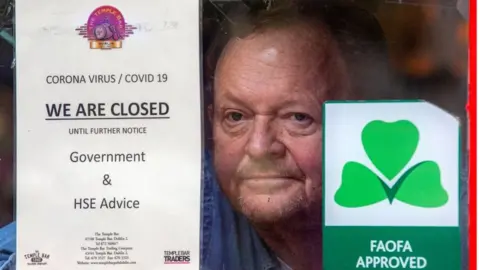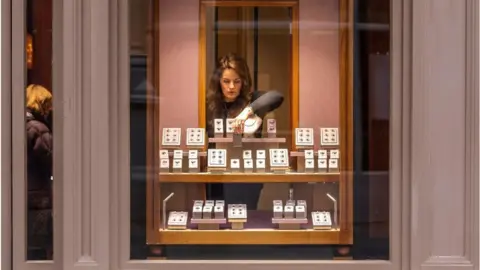Covid-19: Ireland to gradually ease strict lockdown rules
 Getty Images
Getty ImagesThe Irish government has announced a phased relaxation of its strict Covid-19 lockdown over the next six weeks.
The country has been at Level Five, its highest level of restrictions, since Christmas.
On 10 May, close-contact services such as hairdressers can reopen and click-and-collect retail can resume.
From the same date, people can travel outside their own county for the first time in more than four months, and team sports training can resume.
Up to 50 people will be allowed to attend weddings, funerals and other religious services.
To allow grandparents meet their grandchildren and extended families, a vaccinated household can meet indoors with an unvaccinated one.
From 17 May, all non-essential shops can reopen to customers.
From 2 June, hotels, guest houses and self-catering accommodation will be permitted to trade.
All pubs, regardless of whether they serve food, along with restaurants are set to open up for outdoor service on 7 June.
'Gradual, responsible reopening'
Taoiseach (Irish Prime Minister) Micheál Martin praised the public for obeying the lockdown rules during a "very tough and unprecedented year" but he added that continued cooperation was needed for the lockdown relations to proceed as planned.
"To enable all of this, the key factor remains sticking with the strategy - a gradual, responsible reopening with all of us observing the rules and respecting the guidance that remains in place," he said.
"Our choices and our individual behaviour remain key."
The taoiseach added that the government would keep a close eye on the effect that each rule change has on the spread of Covid-19.
 Getty Images
Getty ImagesThe relaxation is premised on containing the new variants of coronavirus and a massive acceleration of the vaccination programme which is way behind target and compares unfavourably with Northern Ireland's rate of vaccinations.
Mr Martin said on Thursday that the vaccine rollout had faced some difficulties but was "clearly the overriding priority".
"No effort whatsoever will be spared to make sure that every vaccine we receive into the country is administered as quickly as possible".
He added that Covid-19 vaccines had been "transformative" in tackling the pandemic around the world and in the Republic of Ireland itself.
"Already, almost all of our most vulnerable are now protected and we can already see that the rates of death, serious illness, hospital admissions and infections in people who have been vaccinated have collapsed."
He said that although the Republic of Ireland's vaccine programme had faced "a range of challenges" including recent supply disruption, almost 30% of people aged over 16 have had one dose to date.
Vaccine targets
On Wednesday, the taoiseach told the Dáil (Irish parliament) that the government hoped it would "get close" to its target of having more than 80% of the population with a first vaccine dose by the end of June and 55% fully vaccinated.
That requires an average of a million people to be vaccinated in April, May and June but ministers and officials concede that they now expect just over 700,000 jabs to be administered by the end of April.
